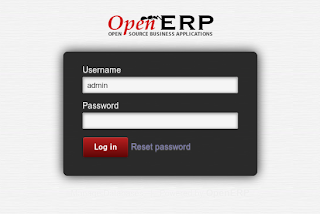how to install openerp 7 on ubuntu 13.10 ?,
its as simple as this :
Openerp v 7 is a robush opensource Enterprise Resource Planning, if you want to make Business Apps Development , you can choose it as your platform. OpenErp has many addons for several applications, includes Customer Relationship Management ,Project management, and tons of free opensource ERP
Modules. Okay, lets start
adding openerp user on ubuntu
make sure that your user is ready now :
sudo su - openerp -s /bin/bash
CTRL + D to exit on it
Install Postgres
sudo apt-get install postgresqladding openerp user on postgres
sudo su - postgrescreateuser --createdb --username postgres --no-createrole --no-superuser --pwprompt openerp
install openerp 7 on ubuntu 13.10
sudo apt-get install graphviz ghostscript postgresql-client python-dateutil python-feedparser python-gdata python-ldap python-libxslt1 python-lxml python-mako python-openid python-psycopg2 python-pybabel python-pychart python-pydot python-pyparsing python-reportlab python-simplejson python-tz python-vatnumber python-vobject python-webdav python-werkzeug python-xlwt python-yaml python-imaging python-matplotlib python-dateutil python-feedparser python-gdata python-ldap python-libxslt1 python-lxml python-mako python-openid python-psycopg2 python-pybabel python-pychart python-pydot python-pyparsing python-reportlab python-simplejson python-tz python-vatnumber python-vobject python-webdav python-werkzeug python-xlwt python-yaml python-zsi python-psycopg2 python-reportlab python-egenix-mxdatetime python-yaml python-dateutil python-webdav python-cherrypy3 python-formencode python-pybabel python-simplejson python-pyparsing libevent-dev python-unittest2 python-mock python-jinja2 python-docutils python-gevent pidentddownload openerp 7
wget http://nightly.openerp.com/7.0/nightly/src/openerp-7.0-latest.tar.gz .then extract the files on your live-source, let say you put it on /mylivesource
create start up script openerp 7
sudo vim /etc/init.d/openerptype a script as below :
#!/bin/sh
### BEGIN INIT INFO
# Provides: openerp-server
# Required-Start: $remote_fs $syslog
# Required-Stop: $remote_fs $syslog
# Should-Start: $network
# Should-Stop: $network
# Default-Start: 2 3 4 5
# Default-Stop: 0 1 6
# Short-Description: Enterprise Resource Management software
# Description: Open ERP is a complete ERP and CRM software.
### END INIT INFO
PATH=/sbin:/bin:/usr/sbin:/usr/bin
#DAEMON=/usr/bin/openerp-server
DAEMON=/mylivesource/openerp-server
NAME=openerp-server
DESC=openerp-server
CONFIG=/mylivesource/install/openerp-server.conf
LOGFILE=/var/log/openerp/openerp.log
USER=openerp
test -x ${DAEMON} || exit 0
set -e
case "${1}" in
start)
echo -n "Starting ${DESC}: "
start-stop-daemon --start --quiet --pidfile /var/run/${NAME}.pid \
--chuid ${USER} --background --make-pidfile \
--exec ${DAEMON} -- --config=${CONFIG} --debug \
--logfile=${LOGFILE}
echo "${NAME}."
;;
stop)
echo -n "Stopping ${DESC}: "
start-stop-daemon --stop --quiet --pidfile /var/run/${NAME}.pid \
--oknodo
echo "${NAME}."
;;
restart|force-reload)
echo -n "Restarting ${DESC}: "
start-stop-daemon --stop --quiet --pidfile /var/run/${NAME}.pid \
--oknodo
sleep 1
start-stop-daemon --start --quiet --pidfile /var/run/${NAME}.pid \
--chuid ${USER} --background --make-pidfile \
--exec ${DAEMON} -- --config=${CONFIG} \
--logfile=${LOGFILE}
echo "${NAME}."
;;
*)
N=/etc/init.d/${NAME}
echo "Usage: ${NAME} {start|stop|restart|force-reload}" >&2
exit 1
;;
esac
exit 0
then make it auto startup
sudo chmod 755 /etc/init.d/openerp
sudo chown root: /etc/init.d/openerpsudo update-rc.d openerp defaults
edit your basic configuration openerp 7
[options]addons_path = /mylivesource/openerp/addons/
assert_exit_level = error
csv_internal_sep = ,
db_host = localhost
db_maxconn = 64
db_name = your_database (leave it blank if you are starting to create)
db_password = your_db_password
db_port = 5432
db_user = openerp
then start your openerp
maybe you can modify the style then, so it could be like this.
..show all:.
.
how to install openerp 7 on ubuntu 13.10 ?,
its as simple as this :
Openerp v 7 is a robush opensource Enterprise Resource Planning, if you want to make Business Apps Development , you can choose it as your platform. OpenErp has many addons for several applications, includes Customer Relationship Management ,Project management, and tons of free opensource ERP
Modules. Okay, lets start
adding openerp user on ubuntu
make sure that your user is ready now :
sudo su - openerp -s /bin/bash
CTRL + D to exit on it
Install Postgres
sudo apt-get install postgresqladding openerp user on postgres
sudo su - postgrescreateuser --createdb --username postgres --no-createrole --no-superuser --pwprompt openerp
install openerp 7 on ubuntu 13.10
sudo apt-get install graphviz ghostscript postgresql-client python-dateutil python-feedparser python-gdata python-ldap python-libxslt1 python-lxml python-mako python-openid python-psycopg2 python-pybabel python-pychart python-pydot python-pyparsing python-reportlab python-simplejson python-tz python-vatnumber python-vobject python-webdav python-werkzeug python-xlwt python-yaml python-imaging python-matplotlib python-dateutil python-feedparser python-gdata python-ldap python-libxslt1 python-lxml python-mako python-openid python-psycopg2 python-pybabel python-pychart python-pydot python-pyparsing python-reportlab python-simplejson python-tz python-vatnumber python-vobject python-webdav python-werkzeug python-xlwt python-yaml python-zsi python-psycopg2 python-reportlab python-egenix-mxdatetime python-yaml python-dateutil python-webdav python-cherrypy3 python-formencode python-pybabel python-simplejson python-pyparsing libevent-dev python-unittest2 python-mock python-jinja2 python-docutils python-gevent pidentddownload openerp 7
wget http://nightly.openerp.com/7.0/nightly/src/openerp-7.0-latest.tar.gz .then extract the files on your live-source, let say you put it on /mylivesource
create start up script openerp 7
sudo vim /etc/init.d/openerptype a script as below :
#!/bin/sh
### BEGIN INIT INFO
# Provides: openerp-server
# Required-Start: $remote_fs $syslog
# Required-Stop: $remote_fs $syslog
# Should-Start: $network
# Should-Stop: $network
# Default-Start: 2 3 4 5
# Default-Stop: 0 1 6
# Short-Description: Enterprise Resource Management software
# Description: Open ERP is a complete ERP and CRM software.
### END INIT INFO
PATH=/sbin:/bin:/usr/sbin:/usr/bin
#DAEMON=/usr/bin/openerp-server
DAEMON=/mylivesource/openerp-server
NAME=openerp-server
DESC=openerp-server
CONFIG=/mylivesource/install/openerp-server.conf
LOGFILE=/var/log/openerp/openerp.log
USER=openerp
test -x ${DAEMON} || exit 0
set -e
case "${1}" in
start)
echo -n "Starting ${DESC}: "
start-stop-daemon --start --quiet --pidfile /var/run/${NAME}.pid \
--chuid ${USER} --background --make-pidfile \
--exec ${DAEMON} -- --config=${CONFIG} --debug \
--logfile=${LOGFILE}
echo "${NAME}."
;;
stop)
echo -n "Stopping ${DESC}: "
start-stop-daemon --stop --quiet --pidfile /var/run/${NAME}.pid \
--oknodo
echo "${NAME}."
;;
restart|force-reload)
echo -n "Restarting ${DESC}: "
start-stop-daemon --stop --quiet --pidfile /var/run/${NAME}.pid \
--oknodo
sleep 1
start-stop-daemon --start --quiet --pidfile /var/run/${NAME}.pid \
--chuid ${USER} --background --make-pidfile \
--exec ${DAEMON} -- --config=${CONFIG} \
--logfile=${LOGFILE}
echo "${NAME}."
;;
*)
N=/etc/init.d/${NAME}
echo "Usage: ${NAME} {start|stop|restart|force-reload}" >&2
exit 1
;;
esac
exit 0
then make it auto startup
sudo chmod 755 /etc/init.d/openerp
sudo chown root: /etc/init.d/openerpsudo update-rc.d openerp defaults
edit your basic configuration openerp 7
[options]addons_path = /mylivesource/openerp/addons/
assert_exit_level = error
csv_internal_sep = ,
db_host = localhost
db_maxconn = 64
db_name = your_database (leave it blank if you are starting to create)
db_password = your_db_password
db_port = 5432
db_user = openerp
then start your openerp
maybe you can modify the style then, so it could be like this.

No comments:
Post a Comment